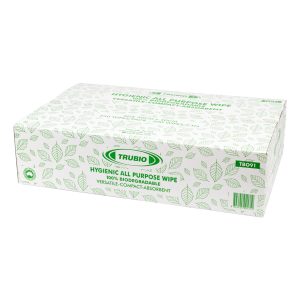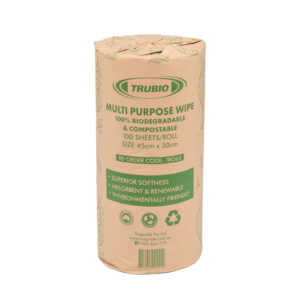What is Biodegradable?
The term ‘biodegradable’ refers to the ability of a material to decompose over an undefined timeline with the help of micro-organisms like bacteria or fungi. This decomposition can either be in the presence of oxygen (aerobic decomposition) or in the absence of oxygen (anaerobic decomposition). The necessary time period for these materials to decompose ranges from a few days to thousands of years to fully break down. The actual rate of biodegradation depends on various factors such as temperature, moisture, oxygen levels, and the presence of microorganisms.
Biodegradable products can be made from both natural and synthetic sources. Organic matter like food waste, leaves and paper products, certain wipes and natural fabrics (i.e. cotton and hemp) and a few plastics sourced from plant-based materials are examples of natural sources that can be used to make biodegradable products. Biodegradable products can also be sourced from petroleum-based synthetic polymers, which is how most biodegradable plastics are created.
Whilst biodegradable materials can help reduce the amount of waste that ends up in landfills by breaking them down, the process is not always as environmentally friendly as it may seem at first glance. Some synthetic biodegradable plastics release harmful substances as they break down, or require specific conditions like high temperatures or industrial composting facilities to fully decompose, making it harder to assess if biodegradable products are more trouble than they’re worth. To make this judgement, materials are assessed against certain criteria: these included volatile solids content, maximum permissible heavy metal content, the degree of biodegradation when compared to the positive control as well as the degree of disintegration.
What is Compostable?
Compostable materials are a specific type of biodegradable material that not only naturally break down, but also contribute valuable nutrients to the soil during their decomposition. By undergoing a controlled decomposition process, normally 12 weeks, they turn into nutrient-rich compost that can be used to enrich soil and support plant growth. This closed-loop system ensures that waste is transformed into a valuable resource, minimizing environmental impact.
 Compostable products are sourced from a combination of recycled, plant-based materials, such as wood pulp, potato starch, fungi, cotton and palm leaves. For a product to be certified as compostable, it must undergo testing in three main areas: the heavy metal content, degree of disintegration after 12 weeks, and ecotoxicity of the soil produced. Some common examples of compostable products include food waste, yard trimmings, and specific types of packaging – such as compostable paper plates, cups and wipes, like the TruBio range at Trugrade.
Compostable products are sourced from a combination of recycled, plant-based materials, such as wood pulp, potato starch, fungi, cotton and palm leaves. For a product to be certified as compostable, it must undergo testing in three main areas: the heavy metal content, degree of disintegration after 12 weeks, and ecotoxicity of the soil produced. Some common examples of compostable products include food waste, yard trimmings, and specific types of packaging – such as compostable paper plates, cups and wipes, like the TruBio range at Trugrade.
Because compostable products disintegrate into entirely non-toxic, natural elements, it not only reduces waste but also puts key nutrients back into our environment, forming an eco-friendly cycle.
In Conclusion:
Both types of materials are much more sustainable than traditional, non-biodegradable options, but there are some key differences to consider. Choosing compostable products over biodegradable ones can actively support the creation of healthy soils through nutrient-rich compost, and promote a more sustainable future. By opting for compostable options, you can actively participate in a regenerative cycle and ensure that your choices contribute to a greener planet.




